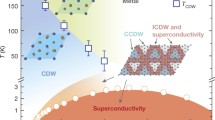Abstract
Transition-metal atoms embedded in an ionic or semiconducting crystal can exist in various oxidation states that have distinct signatures in X-ray photoemission spectroscopy and ‘ionic radii’ which vary with the oxidation state of the atom. These oxidation states are often tacitly associated with a physical ionization of the transition-metal atoms1,2—that is, a literal transfer of charge to or from the atoms. Physical models have been founded on this charge-transfer paradigm3,4,5,6, but first-principles quantum mechanical calculations show only negligible changes in the local transition-metal charge7,8,9,10,11,12 as the oxidation state is altered. Here we explain this peculiar tendency of transition-metal atoms to maintain a constant local charge under external perturbations in terms of an inherent, homeostasis-like negative feedback. We show that signatures of oxidation states and multivalence—such as X-ray photoemission core-level shifts, ionic radii and variations in local magnetization—that have often been interpreted as literal charge transfer3,4,13,14,15,16 are instead a consequence of the negative-feedback charge regulation.





Similar content being viewed by others
References
Wells, A. F. Structural Inorganic Chemistry (Clarendon, Oxford, UK, 1975)
Cotton, F. A. & Wilkinson, G. Advanced Inorganic Chemistry (Wiley, New York, 1988)
Goodenough, J. B. & Rivadulla, F. Bond-length fluctuations in transition-metal oxides. Mod. Phys. Lett. B 22, 1057–1081 (2005)
Solomon, E. I., Hedman, B., Hodgson, K. O., Dey, A. & Szilagyi, R. K. Ligand K-edge X-ray absorption spectroscopy: covalency of ligand-metal bonds. Coord. Chem. Rev. 249, 97–129 (2005)
Shannon, R. D. & Prewitt, C. T. Effective ionic radii in oxides and fluorides. Acta Crystallogr. B 25, 925–946 (1969)
Koster, G., Geballe, T. H. & Moyzhes, B. Charge instabilities in the ionic model of metal oxides: importance of polarization energy. Phys. Rev. B 66, 085109 (2002)
Zunger, A. & Lindefelt, U. Substitutional 3d impurities in silicon: a self-regulating system. Solid State Commun. 45, 343–346 (1983)
Zunger, A. in Solid State Physics Vol. 39 (eds Seitz, F., Turnbull, D. & Ehrenreich, H.) 275–464 (Academic, New York, 1986)
Wolverton, C. & Zunger, A. First-principles prediction of vacancy order-disorder and intercalation battery voltages in Li x CoO2 . Phys. Rev. Lett. 81, 606–609 (1998)
Leonov, I., Yaresko, A. N., Antonov, V. N., Korotin, M. A. & Anisimov, V. I. Charge and orbital order in Fe3O4 . Phys. Rev. Lett. 93, 146404 (2004)
Jeng, H.-T., Guo, G. Y. & Huang, D. J. Charge-orbital ordering and Verwey transition in magnetite. Phys. Rev. Lett. 93, 156403 (2004)
Luo, W. et al. Orbital-occupancy versus charge ordering and the strength of electron correlations in electron-doped CaMnO3 . Phys. Rev. Lett. 99, 036402 (2007)
Ikeda, N. et al. Ferroelectricity from iron valence ordering in the charge-frustrated system LuFe2O4 . Nature 436, 1136–1138 (2005)
Angst, M. et al. Charge order with integer iron valence in Fe2OBO3 . Phys. Rev. Lett. 99, 086403 (2007)
Shim, J. H. & Lee, S. Coexistence of two different Cr ions by self-doping in half-metallic CrO2 nanorods. Phys. Rev. Lett. 99, 057209 (2007)
Mazin, I. I. et al. Charge ordering as alternative to Jahn-Teller distortion. Phys. Rev. Lett. 98, 176406 (2007)
Mahadevan, P., Zunger, A. & Sarma, D. D. Unusual directional dependence of exchange energies in GaAs diluted magnetic semiconductors with Mn: Is the RKKY description relevant? Phys. Rev. Lett. 93, 177201 (2004)
Clerjaud, B. Transition-metal impurities in III–V compounds. J. Phys. C 18, 3615–3661 (1985)
Haldane, F. D. M. & Anderson, P. W. Simple model of multiple charge states of transition-metal impurities in semiconductors. Phys. Rev. B 13, 2553–2559 (1976)
Karppinen, M., Asako, I., Motohashi, T. & Yamauchi, H. Oxygen nonstoichiometry and actual Co valence in Na x CoO2–δ . . Phys. Rev. B 71, 092105 (2005)
Kresse, G. & Furthmüller, J. Efficient iterative schemes for ab initio total-energy calculations using a plane-wave basis set. Phys. Rev. B 54, 11169–11186 (1996)
Kresse, G. & Joubert, D. From ultrasoft pseudopotentials to the projector augmented-wave method. Phys. Rev. B 59, 1758–1775 (1999)
Persson, C., Zhao, Y. J., Lany, S. & Zunger, A. n-type doping in CuInSe2 and CuGaSe2 . Phys. Rev. B 72, 035211 (2005)
Acknowledgements
H.R. thanks G. Trimarchi and J. Chan for discussions and for reading the manuscript. A.Z. thanks P. Mahadevan for interest in the early stages of this problem. This work was funded by the US Department of Energy, Office of Science, under NREL Contract No. DE-AC36-99GO10337.
Author Contributions H.R. carried out the calculations, analysed the results and wrote the paper. S.L. and A.Z. contributed to the design of the study, the analysis of results and the writing of the paper.
Author information
Authors and Affiliations
Corresponding authors
Supplementary information
Supplementary information
The file contains Supplementary Discussion 'A' with a detailed account on how electronic configurations are obtained from ab initio calculation, including Supplementary Figures 1 and 2. and Supplementary Discussion 'B' with a discussion how oxidation states can be identified from level occupation and core shifts, including additional references. (PDF 155 kb)
Rights and permissions
About this article
Cite this article
Raebiger, H., Lany, S. & Zunger, A. Charge self-regulation upon changing the oxidation state of transition metals in insulators. Nature 453, 763–766 (2008). https://doi.org/10.1038/nature07009
Received:
Accepted:
Issue Date:
DOI: https://doi.org/10.1038/nature07009
- Springer Nature Limited
This article is cited by
-
Electronic-scale assessment of high-temperature oxidation mechanisms in a novel Fe-based alloy
Journal of Iron and Steel Research International (2024)
-
Cr-containing wastewater treatment based on Cr self-catalysis: a critical review
Frontiers of Environmental Science & Engineering (2024)
-
Non-covalent ligand-oxide interaction promotes oxygen evolution
Nature Communications (2023)
-
Achieving ultrafast superlubricity with layered double hydroxides
Nano Research (2023)
-
A rigorous theory of valence
Structural Chemistry (2023)





